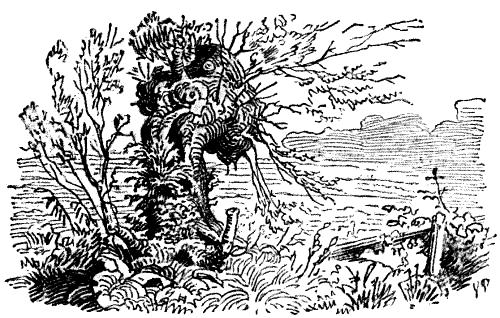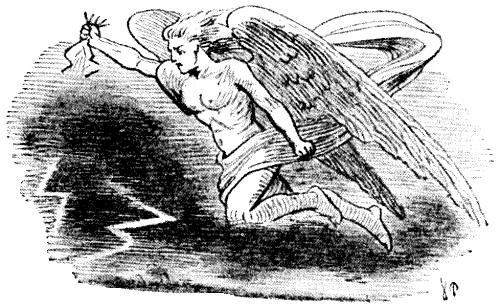
The Buckwheatby Hans Christian Andersen |
Poligonode Hans Christian Andersen |

| Very often, after a violent
thunder-storm, a field of buckwheat appears blackened and
singed, as if a flame of fire had passed over it. The
country people say that this appearance is caused by
lightning; but I will tell you what the sparrow says, and
the sparrow heard it from an old willow-tree which grew
near a field of buckwheat, and is there still. It is a
large venerable tree, though a little crippled by age.
The trunk has been split, and out of the crevice grass
and brambles grow. The tree bends for-ward slightly, and
the branches hang quite down to the ground just like
green hair. Corn grows in the surrounding fields, not
only rye and barley, but oats,– pretty oats that, when
ripe, look like a number of little golden canary-birds
sitting on a bough. The corn has a smiling look and the
heaviest and richest ears bend their heads low as if in
pious humility. Once there was also a field of buckwheat,
and this field was exactly opposite to old willow-tree.
The buckwheat did not bend like the other grain, but
erected its head proudly and stiffly on the stem. “I am
as valuable as any other corn,” said he, “and I am
much handsomer; my flowers are as beautiful as the bloom
of the apple blossom, and it is a pleasure to look at us.
Do you know of anything prettier than we are, you old
willow-tree?” And the willow-tree nodded his head, as if he would say, “Indeed I do.” But the buckwheat spread itself out with pride, and said, “Stupid tree; he is so old that grass grows out of his body.” There arose a very terrible storm. All the field-flowers folded their leaves together, or bowed their little heads, while the storm passed over them, but the buckwheat stood erect in its pride. “Bend your head as we do,” said the flowers. “I have no occasion to do so,” replied the buckwheat. “Bend your head as we do,” cried the ears of corn; “the angel of the storm is coming; his wings spread from the sky above to the earth beneath. He will strike you down before you can cry for mercy.” “But I will not bend my head,” said the buckwheat. “Close your flowers and bend your leaves,” said the old willow-tree. “Do not look at the lightning when the cloud bursts; even men cannot do that. In a flash of lightning heaven opens, and we can look in; but the sight will strike even human beings blind. What then must happen to us, who only grow out of the earth, and are so inferior to them, if we venture to do so?” “Inferior, indeed!” said the buckwheat. “Now I intend to have a peep into heaven.” Proudly and boldly he looked up, while the lightning flashed across the sky as if the whole world were in flames. When the dreadful storm had passed, the flowers and the corn raised their drooping heads in the pure still air, refreshed by the rain, but the buckwheat lay like a weed in the field, burnt to blackness by the lightning. The branches of the old willow-tree rustled in the wind, and large water-drops fell from his green leaves as if the old willow were weeping. Then the sparrows asked why he was weeping, when all around him seemed so cheerful. “See,” they said, how the sun shines, and the clouds float in the blue sky. Do you not smell the sweet perfume from flower and bush? Wherefore do you weep, old willow-tree?“ Then the willow told them of the haughty pride of the buckwheat, and of the punishment which followed in consequence. This is the story told me by the sparrows one evening when I begged them to relate some tale to me. |
Se post fulmotondro oni
preteriras poligonan kampon, oni ofte rimarkas, ke ghi
aspektas nigre kaj kvazau bruligite. Oni havas la
impreson, kvazau flamo de fajro transiris la kampon, kaj
la kamparano tiam diras: “Tion la poligono ricevis de
la fulmo!” Sed kial ghi tion ricevis? Mi rakontos, kion
diris al mi la pasero, kaj al la pasero tion rakontis
maljuna saliko, kiu staris apud poligona kampo kaj
ankorau tie staras. Tio estas tre respektinda alta
saliko, sed tuberplena kaj maljuna, en la mezo ghi estas
disfendita, kaj el la kavajho elkreskas herbo kaj rubuso.
La arbo estas klinita antauen, kaj la branchoj pendas
malsupren al la tero, kvazau ili estus verdaj longaj
haroj. Sur chiuj kampoj chirkaue kreskis greno, sekalo, hordeo kaj aveno. Ho, la charma aveno! Kiam ghi estas matura, ghi aspektas kiel tuta amaso da malgrandaj flavaj kanarioj sur unu brancoh. La greno promesis richan kaj benitan rikolton, kaj ju pli peza ghi estis, des pli profunde ghi klinighis en pia humileco. Sed tie estis ankau kampo kun poligono, kaj ghi kushis guste kontrau la maljuna saliko. La poligono ne havis intencon klini sin kiel la alia greno; ghi tenis la kapon alte kaj staris fiere kaj rigide. “Mi estas tiel same richa kiel la spikoj,” ghi diris, “kaj krom tio mi estas multe pli bela. Miaj florajhoj lau sia beleco estas egalaj al la florajhoj de la pomarboj. Estas plezuro rigardi min kaj la miajn. Chu vi konas iun, kiu aspektas pli bele ol ni, vi maljuna saliko?” Kaj la saliko balancis la kapon, kvazau ghi volus diri: “Certe mi konas!” Sed la poligono plenblovis sin de malhumileco kaj diris: “La malsagha arbo, ghi estas tiel maljuna, ke al ghi en la ventro kreskas jam herbo!” Subite amasighis teruraj fulmotondraj nuboj. Chiuj kampaj floroj kunmetis siajn foliojn au klinis siajn delikatajn kapojn, kiam la fulmotondro kuris super ili. Nur la poligono fanfaronis per sia fiereco. “Klinu vian kapon kiel ni!” diris la floroj, “Tion mi tute ne bezonas!” respondis la poligono. “Klinu vian kapon kiel ni!” kriis la greno! “jen alflugas la anghelo de fulmotondro! Li havas flugilojn, kiuj estas longaj de la nuboj ghis la tero. Li disbatos vin, antau ol vi havos la tempon petegi lin pri indulgo!” “Mi tamen ne volas min klini!” diris la poligono. “Fermu viajn florajhojn kaj klinu viajn foliojn!” admonis ankau la maljuna saliko. “Ne rigardu en la fulmon, kiam la nubo diskrevos! Ech al la homoj tio ne estas permesata, char tra la fulmo oni povas enrigardi en la chielon de Dio, sed tiu vido blindigus ech la homojn. Kio do farighus des pli al ni, al la kreskajhoj de la tero, se ni tion permesus al ni, kiuj estas ja multe malpli gravaj!” “Multe malpli gravaj?” respondis la poligono. “Nu, mi do ghuste volas enrigardi en la chielon de Dio!” Kaj ghi efektive tion faris en sia malhumileco kaj fiereco. Aspektis tiel, kvazau la tuta mondo staras en flamoj, tiel forte fulmis. Kiam la fulmotondro pasis, la floroj kaj la greno staris en la trankvila, pura aero refreshigitaj de la pluvo, sed la poligono estis karbonigre brulkolorita de la fulmo; ghi estis nun senviva, senvalora kreskajho sur la kampo. La maljuna saliko movis siajn branchojn en la vento, kaj grandaj gutoj da akvo falis de ghiaj verdaj folioj, kvazau la arbo plorus; kaj la paseroj demandis: “Kial vi ploras? chi tie estas ja mirinde freshige! vidu, kiel la suno lumas, vidu, kiel la nuboj rapide kuras! chu vi povas senti la odoron de la floroj kaj de la arbetoj? kial vi tiel ploras, vi maljuna saliko?” Kaj la saliko rakontis pri la fiereco, pri la malhumileco kaj pri la puno de la poligono. La puno chiam sekvas. Mi, kiu rakontas la historion, audis ghin de la paseroj; ili rakontis ghin al mi unu vesperon, kiam mi petis ilin pri fabelo. |

Часто, когда после грозы идешь полем, видишь, что гречиху опалило дочерна, будто по ней пробежал огонь; крестьяне в таких случаях говорят: "Это ее опалило молнией!" Но почему?
А вот что я слышал от воробья, которому рассказывала об этом старая ива, растущая возле гречишного поля - дерево такое большое, почтенное и старое-престарое, все корявое, с трещиною посредине. Из трещины растут трава и ежевика; ветви дерева, словно длинные зеленые кудри, свешиваются до самой земли.
Поля вокруг ивы были засеяны рожью, ячменем и овсом - чудесным овсом, похожим, когда созреет, на веточки, усеянные маленькими желтенькими канарейками. Хлеба стояли прекрасные, и чем полнее были колосья, тем ниже склоняли они в смирении свои головы к земле.
Тут же, возле старой ивы, было поле с гречихой; гречиха не склоняла головы, как другие хлеба, а держалась гордо и прямо.
- Я не беднее хлебных колосьев! - говорила она. - Да к тому же еще красивее. Мои цветы не уступят цветам яблони. Любо-дорого посмотреть! Знаешь ли ты, старая ива, кого-нибудь красивее меня?
Но ива только качала головой, как бы желая сказать: "Конечно, знаю!" А гречиха надменно говорила:
- Глупое дерево, у него от старости из желудка трава растет!
Вдруг поднялась страшная непогода; все полевые цветы свернули лепестки и склонили свои головки; одна гречиха красовалась по-прежнему.
- Склони голову! - говорили ей цветы.
- Незачем! - отвечала гречиха.
- Склони голову, как мы! - закричали ей колосья. - Сейчас промчится под облаками ангел бури! Крылья его доходят до самой земли! Он снесет тебе голову, прежде чем ты успеешь взмолиться о пощаде!
- Ну, а я все-таки не склоню головы! - сказала гречиха.
- Сверни лепестки и склони голову! - сказала ей и старая ива. - Не гляди на молнию, когда она раздирает облака! Сам человек не дерзает этого: в это время можно заглянуть в самое небо господне, а за такой грех господь карает человека слепотой. Что же ожидает тогда нас? Ведь мы, бедные полевые злаки, куда ниже, ничтожнее человека!
- Ниже? - сказала гречиха. - Так вот же я возьму и загляну в небо господне!
И она в самом деле решилась на это в своем горделивом упорстве. Тут такая сверкнула молния, как будто весь мир загорелся, когда же снова прояснилось, цветы и хлеба, освеженные и омытые дождем, радостно вдыхали в себя мягкий, чистый воздух. А гречиха была вся опалена молнией, она погибла и никуда больше не годилась.
Старая ива тихо шевелила ветвями на ветру; с зеленых листьев падали крупные дождевые капли; дерево будто плакало, и воробьи спросили его:
- О чем ты? Посмотри, как славно кругом, как светит солнышко, как бегут облака! А что за аромат несется от цветов и кустов! О чем же ты плачешь, старая ива?
Тогда ива рассказала им о высокомерной гордости и о казни гречихи; гордость всегда ведь бывает наказана. От воробьев же услышал эту историю и я: они прощебетали мне ее как-то раз вечером, когда я просил их рассказать мне сказку.